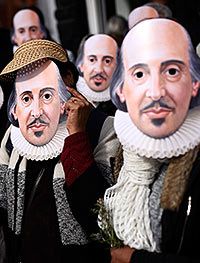
When it comes to celebrating William Shakespeare, can India be far behind?
At the recent celebrations marking the Bard's 400th death anniversary, India's High Commissioner to the United Kingdom Navtej Sarna paid a visit to Stratford-upon-Avon.
Speaking on behalf of the diplomatic corps, Sarna, himself a writer of distinction, delivered the Visitors Response at the celebratory luncheon, attended by 600 distinguished guests.
This is what Navtej Sarna said:
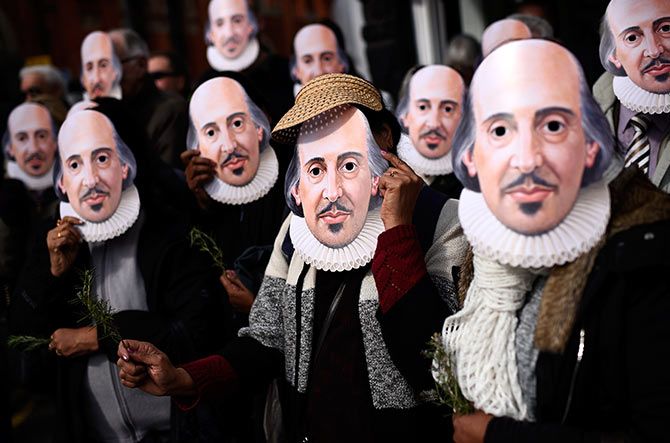
Lord Lieutenant, distinguished guests, it is an honour to speak on behalf of my colleagues in the diplomatic corps from various parts of the world.
Shakespeare has been translated into more than 80 languages and belongs in a sense to the entire world. So what I say on behalf of India may be read, as the lawyers say, mutatis mutandis for several other nations.
Although many of you come from long distances -- in fact some of you come from as far as London -- I am not sure it is possible to understand what this occasion means to someone like me, who comes from much further, from India.
My first encounter with Shakespeare was in the form of a large black volume with the Bard's picture on it on my father's bookshelf. The print was so small that one had to use a magnifying glass to read (it).
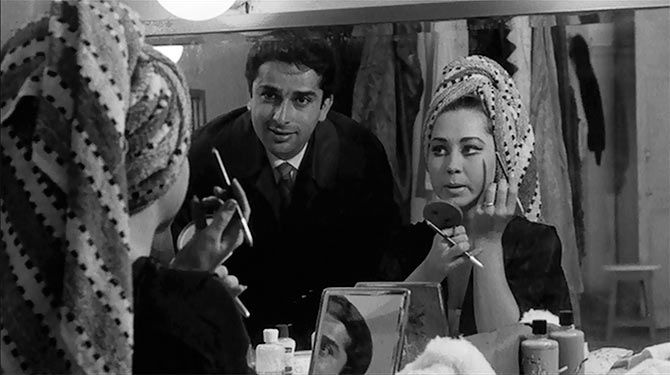
The next memory is of sitting in the school quad in the Indian hills and watching Shakespearewallah performed by the Kendal family. Or of mugging Macbeth soliloquies on a terrace for the senior Cambridge examination:
'Is that a dagger I see before me.
The handle towards my hand...'
Or of an Irish priest headmaster chasing an errant schoolboy, hand outstretched: 'Lend me your ears...'
So, for me, this is a momentous occasion, to be celebrating Shakespeare's birthday in the 400th year of his death on the banks of the Avon.
Shakespeare lived for the most part of his life at the time when India was ruled by Akbar, the great Moghul. It was a famed India of a grand imperial court, gilded riches, spice laden and distant. The Taj Mahal was yet to be built and the East India Company would not begin to lay the foundations of the Raj for another 200 and more years.
Yet, even in that pre-Google age, India was not unknown to Shakespeare... he picked up information and stories from sailors in London and his imagination did the rest. His India is exceptionally rich, famous for its precious pearls and stones, its people are deeply religious and its veiled women are famed for their dark beauty.
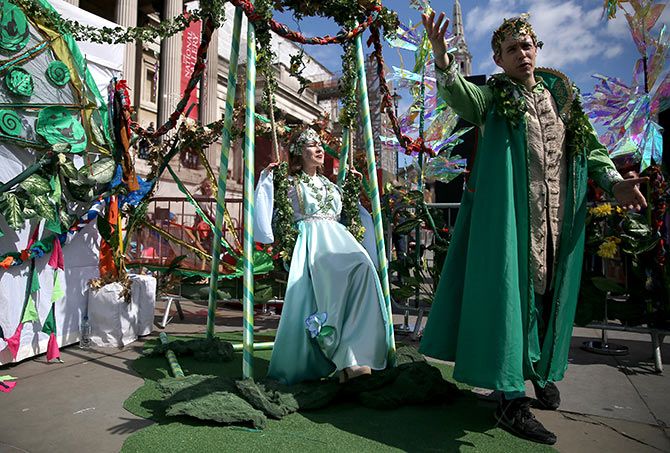
There are various references to India in Shakespearean plays, with four references in A Midsummer Night's Dream.
The earliest reference to India occurs in King Henry VI (Act III, Scene I):
'My crown is in my heart, not on my head;
Not decked with diamonds and Indian stones, nor to be seen:
My crown is called content, a crown it is that seldom kings enjoy.'
There are other references too.
Troilus, the tragic prince of Troy, who had fallen in love with Cressida says, in Troilus And Cressida (Act I, Scene I):
'Her bed is in India,
There she lies, a pearl.'
In The Merchant Of Venice, India, which was a major centre of trade for many countries of Europe, finds a mention on more than one occasion. Protagonist Bassanio makes a reference to his friend Antonio's trade with India (Act III, Scene II):
'What, not one hit?
From Tripolis, from Mexico and England,
From Lisbon, Barbary and India?'
On another occasion, Bassanio tells Antonia (Act III, Scene II):
'Thus ornament is but the guiled shore
To a most dangerous sea, the beauteous scarf
Veiling an Indian beauty...'
In All's Well That Ends Well, Helena who is in love with Bertram, whose high social status is beyond her reach, mourns that her lot is like the sun-worshippers of India:
'Thus, Indian-like,
Religious in mine error, I adore
The sun that looks upon his worshipper
But knows of him no more.'
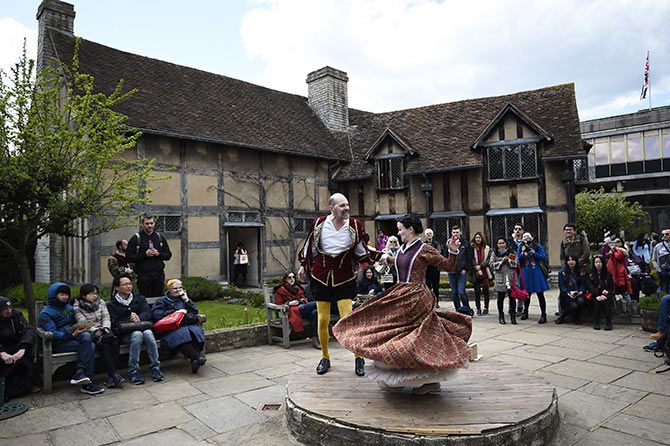
India repaid Shakespeare richly for this attention. By the mid 1700s, less than 150 years after his death, his plays had started being enacted in Calcutta and Bombay, as they were then known, for the entertainment of European traders.
The earliest dramatisations of Shakespeare by Indians were of scenes in schools and colleges. 1822 is the first such known performance, at Hindu College, Calcutta. It initiated a tradition which had continued to this day.
In the next 100 years, the first translations of Shakespeare in an Indian language were ready.
And Bollywood... With the advent of film, it was only a matter of time that filmmakers in India began to mine Shakespeare for material. In one of the earliest talking movies or talkies as they were known, filmmaker and actor Sohrab Modi played Hamlet in his movie called Khoon Ka Khoon (1935). This was followed, in 1941, by J J Madan's take on The Merchant of Venice -- Zalim Saudagar.

These earlier, formalistic and more faithful representations of Shakespeare have given way in independent, post-colonial India to a freer transplanting of Shakespeare to fit into local modern Indian settings -- be these in glamour-laden Bollywood adaptations of The Comedy Of Errors or Romeo and Juliet or in tense, angst-ridden films like Maqbool (Macbeth), Omkara (Othello) and Haider (Hamlet).
So, in today's India, you can find an arts foundation in Chennai staging an annual festival rather proprietarily called Hamara Shakespeare (Our Shakespeare), asserting a new affinity with the poet. Another festival called Reimagining Shakespeare focusses on adaptation, translation, pastiche and parody of the Bard's great works.
Imaginative stage productions include Hamlet, The Clown Prince in which a group of clowns discuss and then enact the great tragedy. Merchant Of Venice in another adaptation is set among Mumbai's stockbrokers. A random crowd of more than 400 sat in Bangalore's Cubbon Park in the sweltering heat recently to see A Midsummer Night's Dream, complete with the lovers' tryst and swaying capes in a canopy of trees...
An optional credit course has been developed in premier law universities on the themes of justice in eight plays of Shakespeare. What better way of teaching the theory behind evidence than Othello's:
'Give me the ocular proof
If you dare not trust that you see, confess not that you know.'
A recently conducted YouGov poll for the British Council covered 18,000 people across 15 countries to mark the 400th death anniversary of the Bard this month.
According to the report titled All the World's, as many as 83 per cent of Indians said they understood Shakespeare, compared to just 58 per cent of Britons. More than a third of people questioned said Shakespeare made them feel more positive about the UK in general, with the figures highest in India (62 per cent).
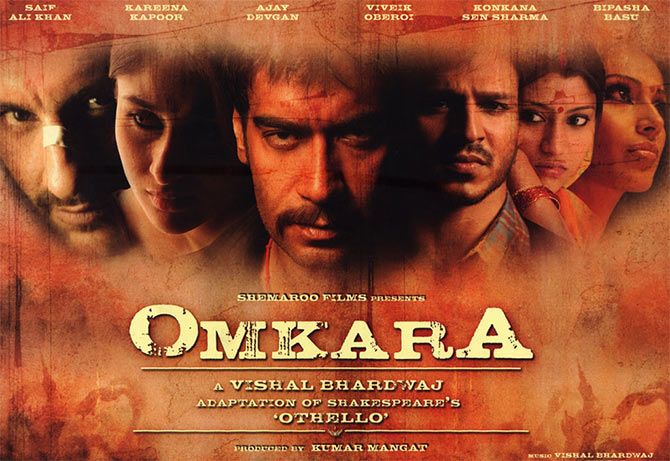
So here we are, feeling very positive about being here, about the occasion and about the country and about the town that produced this great poet.
The simple fact is that Shakespeare does not belong to any one country, or in fact to any one language. A man who had such a fine understanding of human nature that he wrote the most definitive lines on each aspect of it -- to cover jealousy, rage, ambition, love, guilt, power... and so on and so forth -- belongs to humanity as a whole.
And particularly for the English speaking world, who can own the mind that gave the language 2,000 words and several catch phrases.
But for Shakespeare we would not have 'barefaced' or 'leapfrog' or 'lonely' to name just three words or phrases like 'one fell swoop', the 'sound and fury', 'tower of strength'...
But I have spoken long enough. I wouldn't want my words to become, as in As You Like It -- too much of a good thing. I shall therefore, to borrow words from Othello and 'vanish into thin air' and no doubt all of you will instantly recall the words from The Merchant Of Venice -- 'good riddance'!
Thank you.










